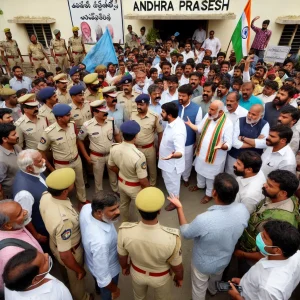
The current plight of farmers in Andhra Pradesh has become a focal point of political discourse, with former Minister Kakani Govardhan Reddy highlighting the detrimental effects of the TDP government’s policies. Under the leadership of Chandrababu Naidu, farmers are reportedly facing severe challenges, including a lack of access to essential resources like seeds and fertilizers, leading to significant financial losses. In stark contrast, the previous YSR Congress Party (YSRCP) regime under Y.S. Jagan Mohan Reddy implemented a series of welfare schemes that significantly benefited farmers and enhanced their livelihoods.
During the YSRCP’s tenure, several initiatives were established to support farmers, most notably the YSR Rythu Bharosa scheme. This program provided financial assistance of up to ₹50,000 per farmer family over three years, with an annual disbursement aimed at helping them meet agricultural costs. Additionally, the scheme offered zero-interest loans and facilitated access to free borewells, cold storage facilities, and food processing units. By directly addressing farmers’ needs, these measures not only alleviated financial burdens but also empowered them to invest in their agricultural practices.
Another significant initiative was the YSR Zero Interest Crop Loan Scheme, which aimed to free farmers from the clutches of moneylenders by providing crop loans without interest. This scheme allowed farmers to borrow up to ₹1 lakh and repay it within a year without incurring any additional financial strain. The direct disbursement of interest subsidies into farmers’ accounts further demonstrated the government’s commitment to supporting agricultural communities.
In contrast, the current TDP regime has dismantled many of these key support systems. Kakani Govardhan Reddy’s remarks underscore the dire situation faced by farmers today, with reports indicating losses of up to ₹40,000 per acre due to inadequate support from procurement centers and a lack of government intervention. The abandonment of schemes like Annadata Sukhibhava, which previously provided crucial assistance to farmers, has exacerbated their struggles.
Moreover, the TDP government’s failure to address issues such as middlemen exploitation has left farmers vulnerable to market fluctuations. The distress among chili farmers, who have incurred losses amounting to ₹6,000 crore due to falling prices and insufficient government action, exemplifies this crisis. Farmers are now forced to rely on loans for cultivation as rising input costs continue to outpace their incomes.
The political vendetta against welfare initiatives introduced during the YSRCP’s rule has not only undermined agricultural support systems but has also eroded trust among farming communities. By privatizing government institutions and neglecting essential services, Naidu’s administration has weakened the economic foundations that once supported Andhra Pradesh’s agricultural sector.
As Kakani Govardhan Reddy warns of potential large-scale protests if the government fails to act on its promises to farmers, it is clear that the current trajectory is unsustainable. The stark contrast between the welfare-oriented policies of the YSRCP and the neglect under TDP rule highlights a critical juncture for Andhra Pradesh’s agricultural landscape.
In conclusion, as farmers grapple with increasing hardships under the TDP regime, it is imperative for the government to reassess its approach and reinstate effective welfare measures that prioritize their needs. The future of agriculture in Andhra Pradesh depends on a renewed commitment to supporting those who feed the nation—an effort that requires urgent action and genuine political will.




